Deontological Analysis of Ethical Challenges at ShenCom Corporation
VerifiedAdded on 2023/04/23
|7
|2026
|238
Essay
AI Summary
This essay examines the ethical challenges faced by ShenCom Corporation (SCC), focusing on employee retrenchment and suicides in protest of company culture. It argues that these situations represent ethical issues, analyzed through the lens of deontological ethics. The essay discusses the limitations of deontology, particularly in the absence of a rational basis for determining individual duties, while emphasizing the importance of goodwill as a determining factor in morally correct actions. Ultimately, the analysis concludes that deontological ethics considers morally obligatory acts irrespective of their consequences on human welfare. Desklib is a platform where students can find similar essays and study resources.
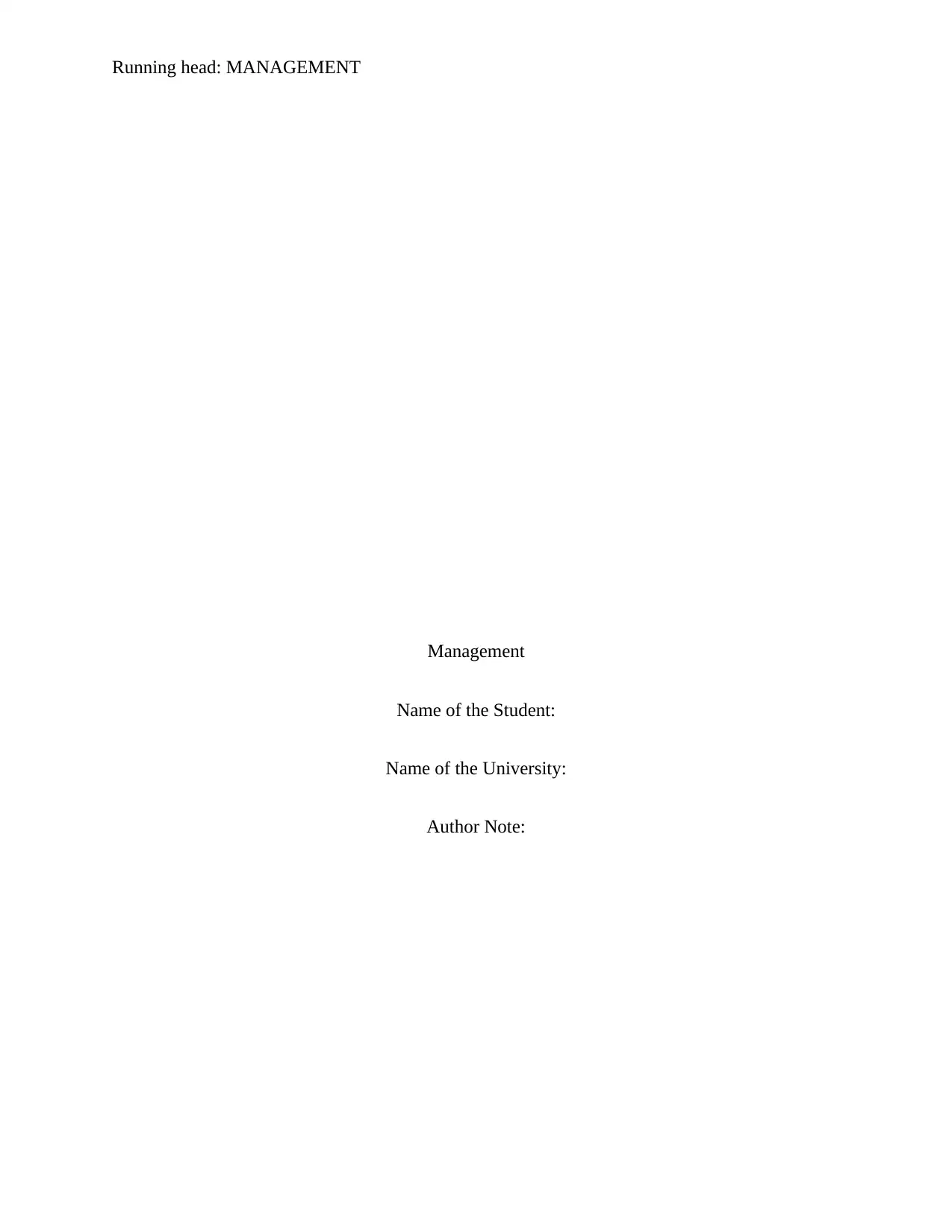
Running head: MANAGEMENT
Management
Name of the Student:
Name of the University:
Author Note:
Management
Name of the Student:
Name of the University:
Author Note:
Paraphrase This Document
Need a fresh take? Get an instant paraphrase of this document with our AI Paraphraser
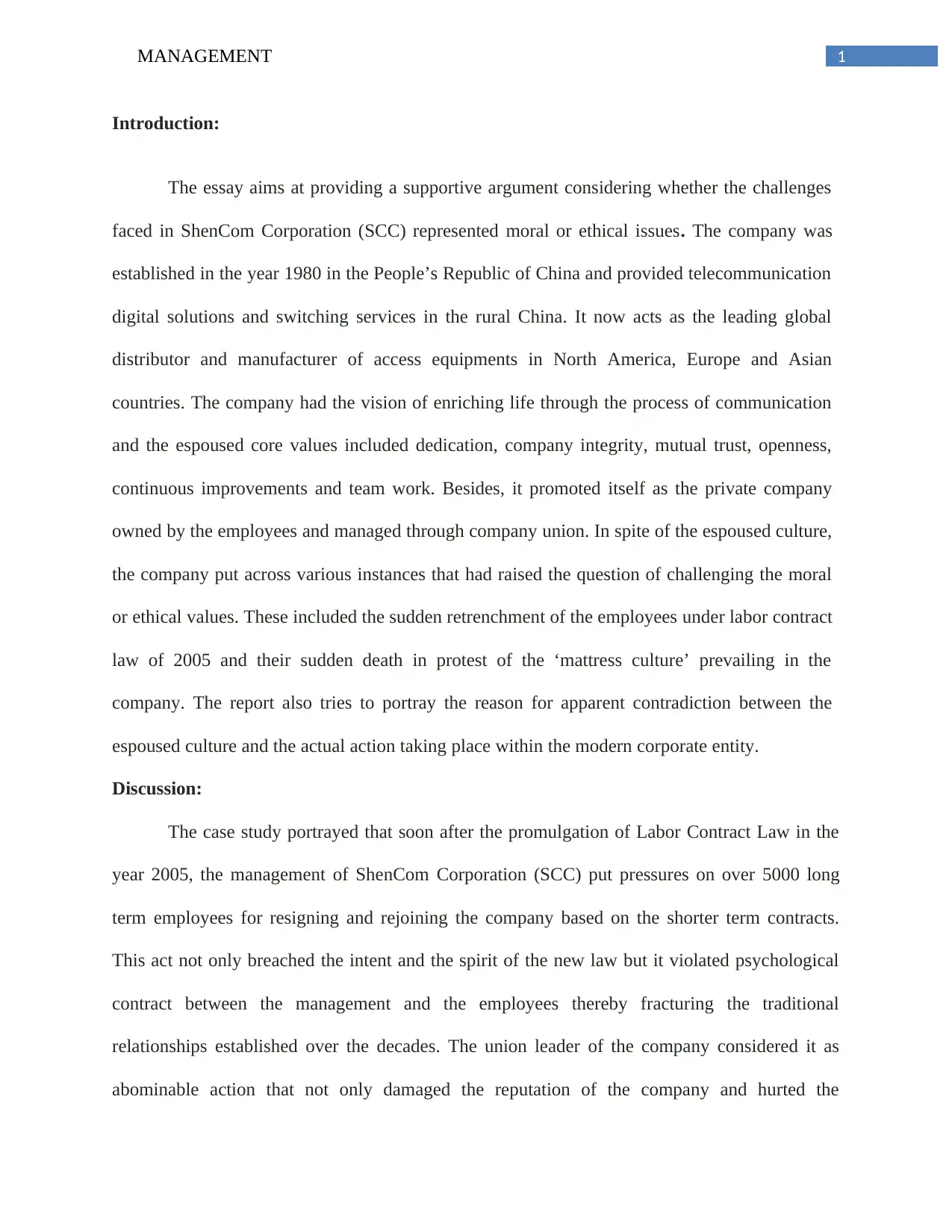
1MANAGEMENT
Introduction:
The essay aims at providing a supportive argument considering whether the challenges
faced in ShenCom Corporation (SCC) represented moral or ethical issues. The company was
established in the year 1980 in the People’s Republic of China and provided telecommunication
digital solutions and switching services in the rural China. It now acts as the leading global
distributor and manufacturer of access equipments in North America, Europe and Asian
countries. The company had the vision of enriching life through the process of communication
and the espoused core values included dedication, company integrity, mutual trust, openness,
continuous improvements and team work. Besides, it promoted itself as the private company
owned by the employees and managed through company union. In spite of the espoused culture,
the company put across various instances that had raised the question of challenging the moral
or ethical values. These included the sudden retrenchment of the employees under labor contract
law of 2005 and their sudden death in protest of the ‘mattress culture’ prevailing in the
company. The report also tries to portray the reason for apparent contradiction between the
espoused culture and the actual action taking place within the modern corporate entity.
Discussion:
The case study portrayed that soon after the promulgation of Labor Contract Law in the
year 2005, the management of ShenCom Corporation (SCC) put pressures on over 5000 long
term employees for resigning and rejoining the company based on the shorter term contracts.
This act not only breached the intent and the spirit of the new law but it violated psychological
contract between the management and the employees thereby fracturing the traditional
relationships established over the decades. The union leader of the company considered it as
abominable action that not only damaged the reputation of the company and hurted the
Introduction:
The essay aims at providing a supportive argument considering whether the challenges
faced in ShenCom Corporation (SCC) represented moral or ethical issues. The company was
established in the year 1980 in the People’s Republic of China and provided telecommunication
digital solutions and switching services in the rural China. It now acts as the leading global
distributor and manufacturer of access equipments in North America, Europe and Asian
countries. The company had the vision of enriching life through the process of communication
and the espoused core values included dedication, company integrity, mutual trust, openness,
continuous improvements and team work. Besides, it promoted itself as the private company
owned by the employees and managed through company union. In spite of the espoused culture,
the company put across various instances that had raised the question of challenging the moral
or ethical values. These included the sudden retrenchment of the employees under labor contract
law of 2005 and their sudden death in protest of the ‘mattress culture’ prevailing in the
company. The report also tries to portray the reason for apparent contradiction between the
espoused culture and the actual action taking place within the modern corporate entity.
Discussion:
The case study portrayed that soon after the promulgation of Labor Contract Law in the
year 2005, the management of ShenCom Corporation (SCC) put pressures on over 5000 long
term employees for resigning and rejoining the company based on the shorter term contracts.
This act not only breached the intent and the spirit of the new law but it violated psychological
contract between the management and the employees thereby fracturing the traditional
relationships established over the decades. The union leader of the company considered it as
abominable action that not only damaged the reputation of the company and hurted the
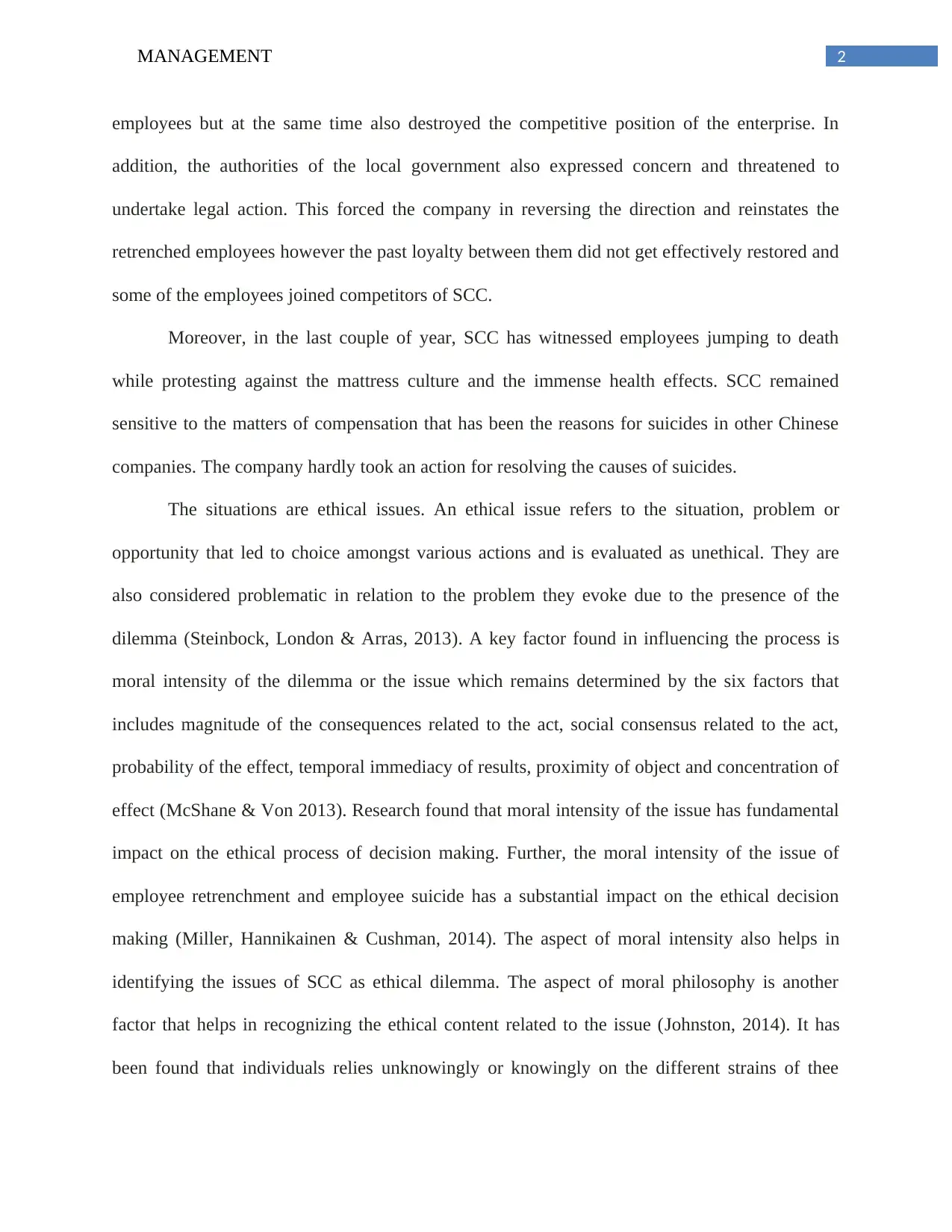
2MANAGEMENT
employees but at the same time also destroyed the competitive position of the enterprise. In
addition, the authorities of the local government also expressed concern and threatened to
undertake legal action. This forced the company in reversing the direction and reinstates the
retrenched employees however the past loyalty between them did not get effectively restored and
some of the employees joined competitors of SCC.
Moreover, in the last couple of year, SCC has witnessed employees jumping to death
while protesting against the mattress culture and the immense health effects. SCC remained
sensitive to the matters of compensation that has been the reasons for suicides in other Chinese
companies. The company hardly took an action for resolving the causes of suicides.
The situations are ethical issues. An ethical issue refers to the situation, problem or
opportunity that led to choice amongst various actions and is evaluated as unethical. They are
also considered problematic in relation to the problem they evoke due to the presence of the
dilemma (Steinbock, London & Arras, 2013). A key factor found in influencing the process is
moral intensity of the dilemma or the issue which remains determined by the six factors that
includes magnitude of the consequences related to the act, social consensus related to the act,
probability of the effect, temporal immediacy of results, proximity of object and concentration of
effect (McShane & Von 2013). Research found that moral intensity of the issue has fundamental
impact on the ethical process of decision making. Further, the moral intensity of the issue of
employee retrenchment and employee suicide has a substantial impact on the ethical decision
making (Miller, Hannikainen & Cushman, 2014). The aspect of moral intensity also helps in
identifying the issues of SCC as ethical dilemma. The aspect of moral philosophy is another
factor that helps in recognizing the ethical content related to the issue (Johnston, 2014). It has
been found that individuals relies unknowingly or knowingly on the different strains of thee
employees but at the same time also destroyed the competitive position of the enterprise. In
addition, the authorities of the local government also expressed concern and threatened to
undertake legal action. This forced the company in reversing the direction and reinstates the
retrenched employees however the past loyalty between them did not get effectively restored and
some of the employees joined competitors of SCC.
Moreover, in the last couple of year, SCC has witnessed employees jumping to death
while protesting against the mattress culture and the immense health effects. SCC remained
sensitive to the matters of compensation that has been the reasons for suicides in other Chinese
companies. The company hardly took an action for resolving the causes of suicides.
The situations are ethical issues. An ethical issue refers to the situation, problem or
opportunity that led to choice amongst various actions and is evaluated as unethical. They are
also considered problematic in relation to the problem they evoke due to the presence of the
dilemma (Steinbock, London & Arras, 2013). A key factor found in influencing the process is
moral intensity of the dilemma or the issue which remains determined by the six factors that
includes magnitude of the consequences related to the act, social consensus related to the act,
probability of the effect, temporal immediacy of results, proximity of object and concentration of
effect (McShane & Von 2013). Research found that moral intensity of the issue has fundamental
impact on the ethical process of decision making. Further, the moral intensity of the issue of
employee retrenchment and employee suicide has a substantial impact on the ethical decision
making (Miller, Hannikainen & Cushman, 2014). The aspect of moral intensity also helps in
identifying the issues of SCC as ethical dilemma. The aspect of moral philosophy is another
factor that helps in recognizing the ethical content related to the issue (Johnston, 2014). It has
been found that individuals relies unknowingly or knowingly on the different strains of thee
⊘ This is a preview!⊘
Do you want full access?
Subscribe today to unlock all pages.

Trusted by 1+ million students worldwide
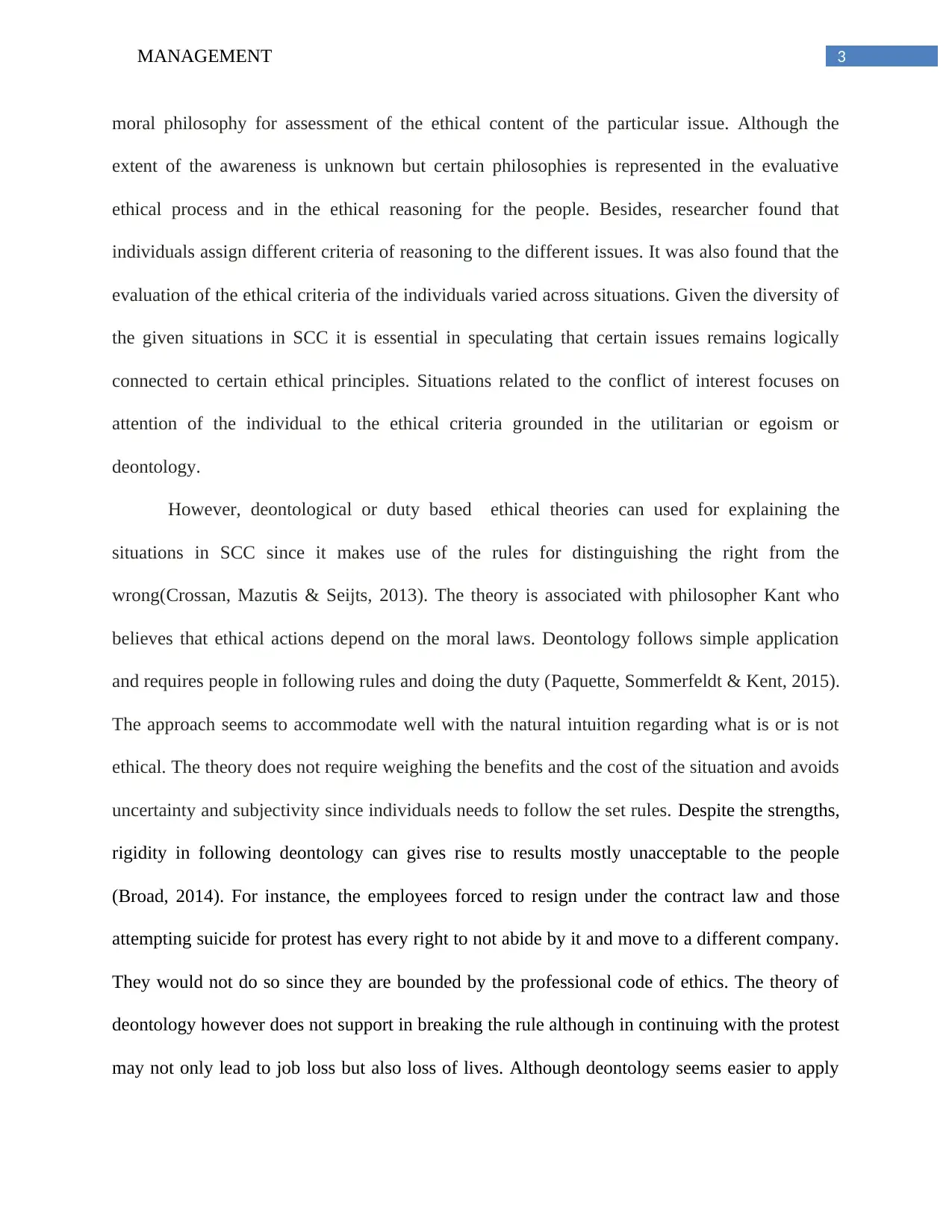
3MANAGEMENT
moral philosophy for assessment of the ethical content of the particular issue. Although the
extent of the awareness is unknown but certain philosophies is represented in the evaluative
ethical process and in the ethical reasoning for the people. Besides, researcher found that
individuals assign different criteria of reasoning to the different issues. It was also found that the
evaluation of the ethical criteria of the individuals varied across situations. Given the diversity of
the given situations in SCC it is essential in speculating that certain issues remains logically
connected to certain ethical principles. Situations related to the conflict of interest focuses on
attention of the individual to the ethical criteria grounded in the utilitarian or egoism or
deontology.
However, deontological or duty based ethical theories can used for explaining the
situations in SCC since it makes use of the rules for distinguishing the right from the
wrong(Crossan, Mazutis & Seijts, 2013). The theory is associated with philosopher Kant who
believes that ethical actions depend on the moral laws. Deontology follows simple application
and requires people in following rules and doing the duty (Paquette, Sommerfeldt & Kent, 2015).
The approach seems to accommodate well with the natural intuition regarding what is or is not
ethical. The theory does not require weighing the benefits and the cost of the situation and avoids
uncertainty and subjectivity since individuals needs to follow the set rules. Despite the strengths,
rigidity in following deontology can gives rise to results mostly unacceptable to the people
(Broad, 2014). For instance, the employees forced to resign under the contract law and those
attempting suicide for protest has every right to not abide by it and move to a different company.
They would not do so since they are bounded by the professional code of ethics. The theory of
deontology however does not support in breaking the rule although in continuing with the protest
may not only lead to job loss but also loss of lives. Although deontology seems easier to apply
moral philosophy for assessment of the ethical content of the particular issue. Although the
extent of the awareness is unknown but certain philosophies is represented in the evaluative
ethical process and in the ethical reasoning for the people. Besides, researcher found that
individuals assign different criteria of reasoning to the different issues. It was also found that the
evaluation of the ethical criteria of the individuals varied across situations. Given the diversity of
the given situations in SCC it is essential in speculating that certain issues remains logically
connected to certain ethical principles. Situations related to the conflict of interest focuses on
attention of the individual to the ethical criteria grounded in the utilitarian or egoism or
deontology.
However, deontological or duty based ethical theories can used for explaining the
situations in SCC since it makes use of the rules for distinguishing the right from the
wrong(Crossan, Mazutis & Seijts, 2013). The theory is associated with philosopher Kant who
believes that ethical actions depend on the moral laws. Deontology follows simple application
and requires people in following rules and doing the duty (Paquette, Sommerfeldt & Kent, 2015).
The approach seems to accommodate well with the natural intuition regarding what is or is not
ethical. The theory does not require weighing the benefits and the cost of the situation and avoids
uncertainty and subjectivity since individuals needs to follow the set rules. Despite the strengths,
rigidity in following deontology can gives rise to results mostly unacceptable to the people
(Broad, 2014). For instance, the employees forced to resign under the contract law and those
attempting suicide for protest has every right to not abide by it and move to a different company.
They would not do so since they are bounded by the professional code of ethics. The theory of
deontology however does not support in breaking the rule although in continuing with the protest
may not only lead to job loss but also loss of lives. Although deontology seems easier to apply
Paraphrase This Document
Need a fresh take? Get an instant paraphrase of this document with our AI Paraphraser
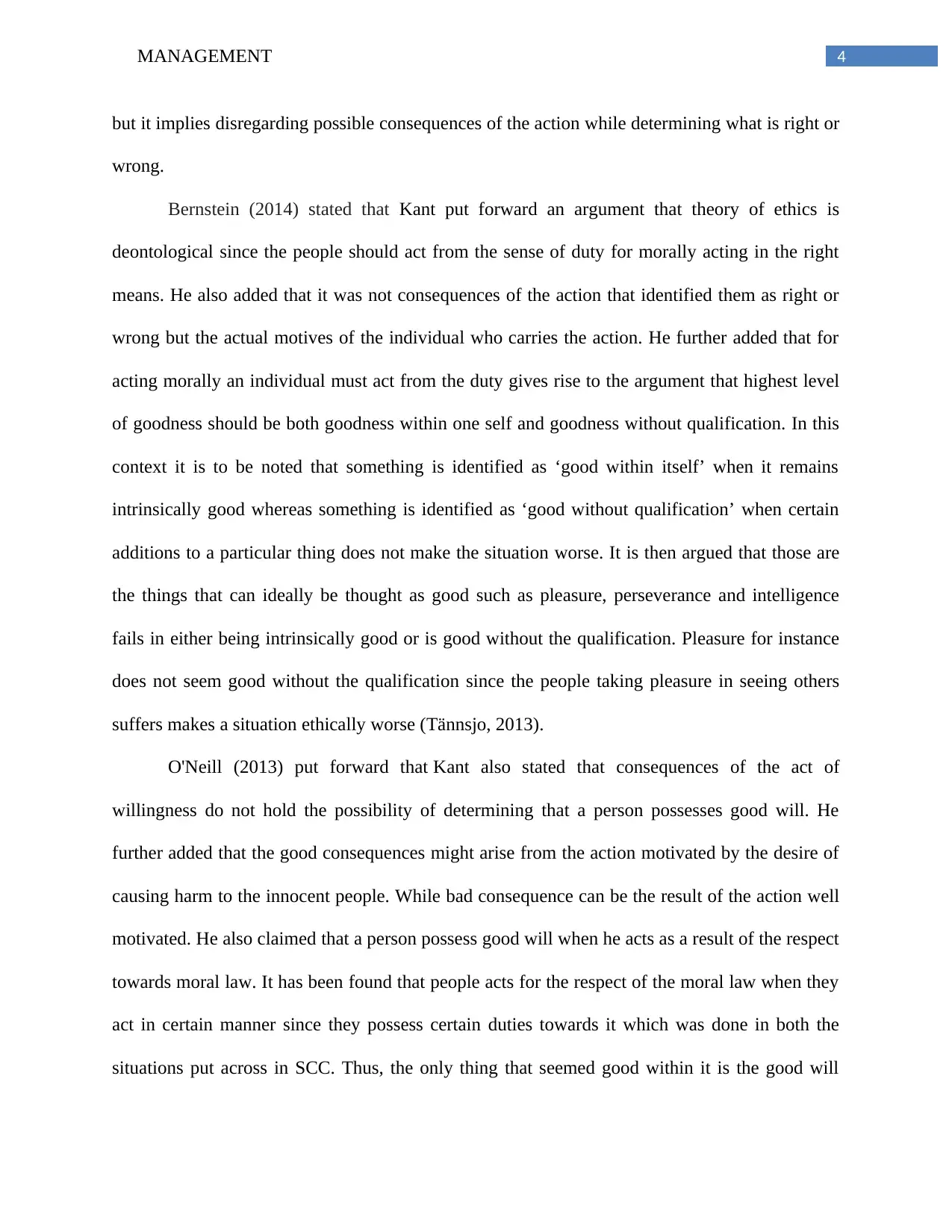
4MANAGEMENT
but it implies disregarding possible consequences of the action while determining what is right or
wrong.
Bernstein (2014) stated that Kant put forward an argument that theory of ethics is
deontological since the people should act from the sense of duty for morally acting in the right
means. He also added that it was not consequences of the action that identified them as right or
wrong but the actual motives of the individual who carries the action. He further added that for
acting morally an individual must act from the duty gives rise to the argument that highest level
of goodness should be both goodness within one self and goodness without qualification. In this
context it is to be noted that something is identified as ‘good within itself’ when it remains
intrinsically good whereas something is identified as ‘good without qualification’ when certain
additions to a particular thing does not make the situation worse. It is then argued that those are
the things that can ideally be thought as good such as pleasure, perseverance and intelligence
fails in either being intrinsically good or is good without the qualification. Pleasure for instance
does not seem good without the qualification since the people taking pleasure in seeing others
suffers makes a situation ethically worse (Tännsjo, 2013).
O'Neill (2013) put forward that Kant also stated that consequences of the act of
willingness do not hold the possibility of determining that a person possesses good will. He
further added that the good consequences might arise from the action motivated by the desire of
causing harm to the innocent people. While bad consequence can be the result of the action well
motivated. He also claimed that a person possess good will when he acts as a result of the respect
towards moral law. It has been found that people acts for the respect of the moral law when they
act in certain manner since they possess certain duties towards it which was done in both the
situations put across in SCC. Thus, the only thing that seemed good within it is the good will
but it implies disregarding possible consequences of the action while determining what is right or
wrong.
Bernstein (2014) stated that Kant put forward an argument that theory of ethics is
deontological since the people should act from the sense of duty for morally acting in the right
means. He also added that it was not consequences of the action that identified them as right or
wrong but the actual motives of the individual who carries the action. He further added that for
acting morally an individual must act from the duty gives rise to the argument that highest level
of goodness should be both goodness within one self and goodness without qualification. In this
context it is to be noted that something is identified as ‘good within itself’ when it remains
intrinsically good whereas something is identified as ‘good without qualification’ when certain
additions to a particular thing does not make the situation worse. It is then argued that those are
the things that can ideally be thought as good such as pleasure, perseverance and intelligence
fails in either being intrinsically good or is good without the qualification. Pleasure for instance
does not seem good without the qualification since the people taking pleasure in seeing others
suffers makes a situation ethically worse (Tännsjo, 2013).
O'Neill (2013) put forward that Kant also stated that consequences of the act of
willingness do not hold the possibility of determining that a person possesses good will. He
further added that the good consequences might arise from the action motivated by the desire of
causing harm to the innocent people. While bad consequence can be the result of the action well
motivated. He also claimed that a person possess good will when he acts as a result of the respect
towards moral law. It has been found that people acts for the respect of the moral law when they
act in certain manner since they possess certain duties towards it which was done in both the
situations put across in SCC. Thus, the only thing that seemed good within it is the good will
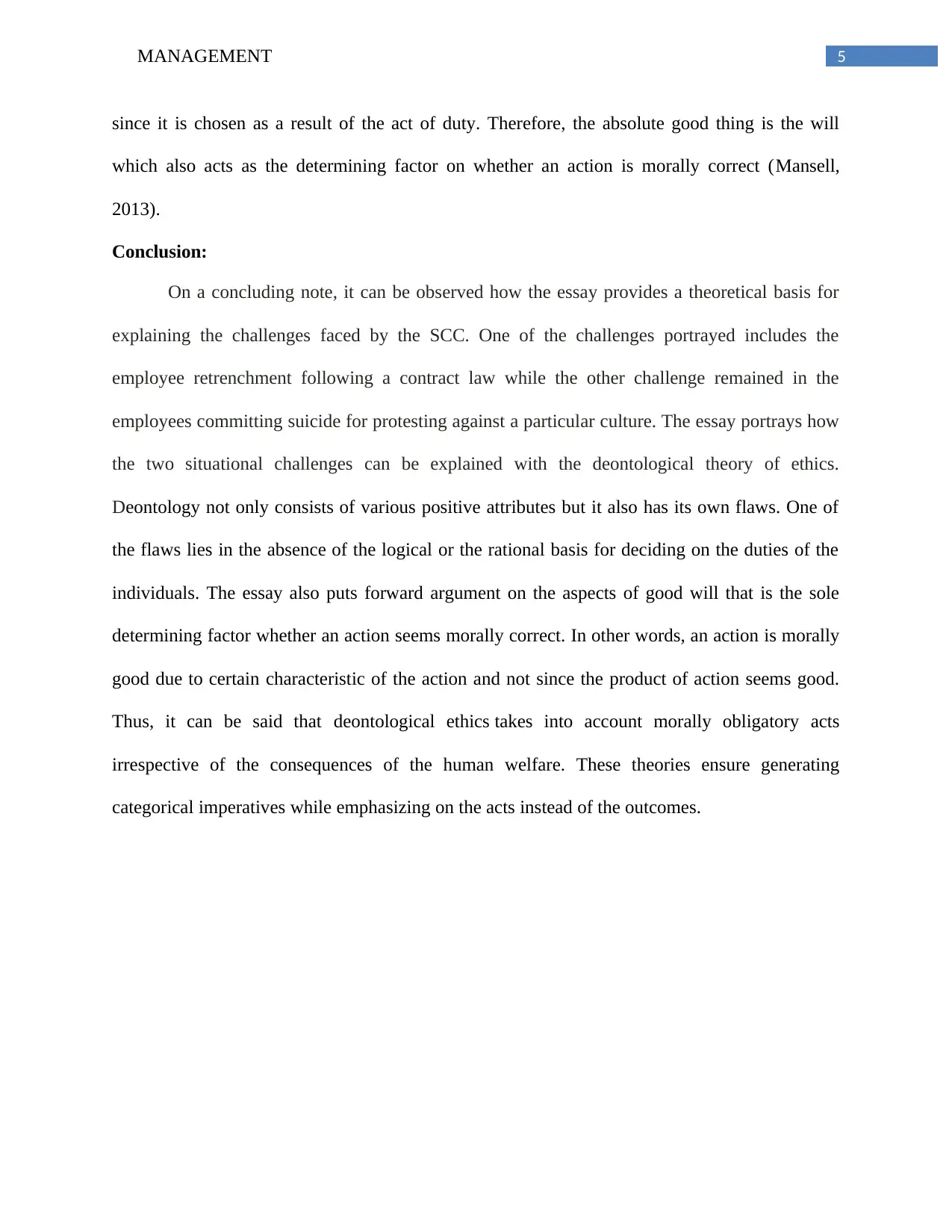
5MANAGEMENT
since it is chosen as a result of the act of duty. Therefore, the absolute good thing is the will
which also acts as the determining factor on whether an action is morally correct (Mansell,
2013).
Conclusion:
On a concluding note, it can be observed how the essay provides a theoretical basis for
explaining the challenges faced by the SCC. One of the challenges portrayed includes the
employee retrenchment following a contract law while the other challenge remained in the
employees committing suicide for protesting against a particular culture. The essay portrays how
the two situational challenges can be explained with the deontological theory of ethics.
Deontology not only consists of various positive attributes but it also has its own flaws. One of
the flaws lies in the absence of the logical or the rational basis for deciding on the duties of the
individuals. The essay also puts forward argument on the aspects of good will that is the sole
determining factor whether an action seems morally correct. In other words, an action is morally
good due to certain characteristic of the action and not since the product of action seems good.
Thus, it can be said that deontological ethics takes into account morally obligatory acts
irrespective of the consequences of the human welfare. These theories ensure generating
categorical imperatives while emphasizing on the acts instead of the outcomes.
since it is chosen as a result of the act of duty. Therefore, the absolute good thing is the will
which also acts as the determining factor on whether an action is morally correct (Mansell,
2013).
Conclusion:
On a concluding note, it can be observed how the essay provides a theoretical basis for
explaining the challenges faced by the SCC. One of the challenges portrayed includes the
employee retrenchment following a contract law while the other challenge remained in the
employees committing suicide for protesting against a particular culture. The essay portrays how
the two situational challenges can be explained with the deontological theory of ethics.
Deontology not only consists of various positive attributes but it also has its own flaws. One of
the flaws lies in the absence of the logical or the rational basis for deciding on the duties of the
individuals. The essay also puts forward argument on the aspects of good will that is the sole
determining factor whether an action seems morally correct. In other words, an action is morally
good due to certain characteristic of the action and not since the product of action seems good.
Thus, it can be said that deontological ethics takes into account morally obligatory acts
irrespective of the consequences of the human welfare. These theories ensure generating
categorical imperatives while emphasizing on the acts instead of the outcomes.
⊘ This is a preview!⊘
Do you want full access?
Subscribe today to unlock all pages.

Trusted by 1+ million students worldwide
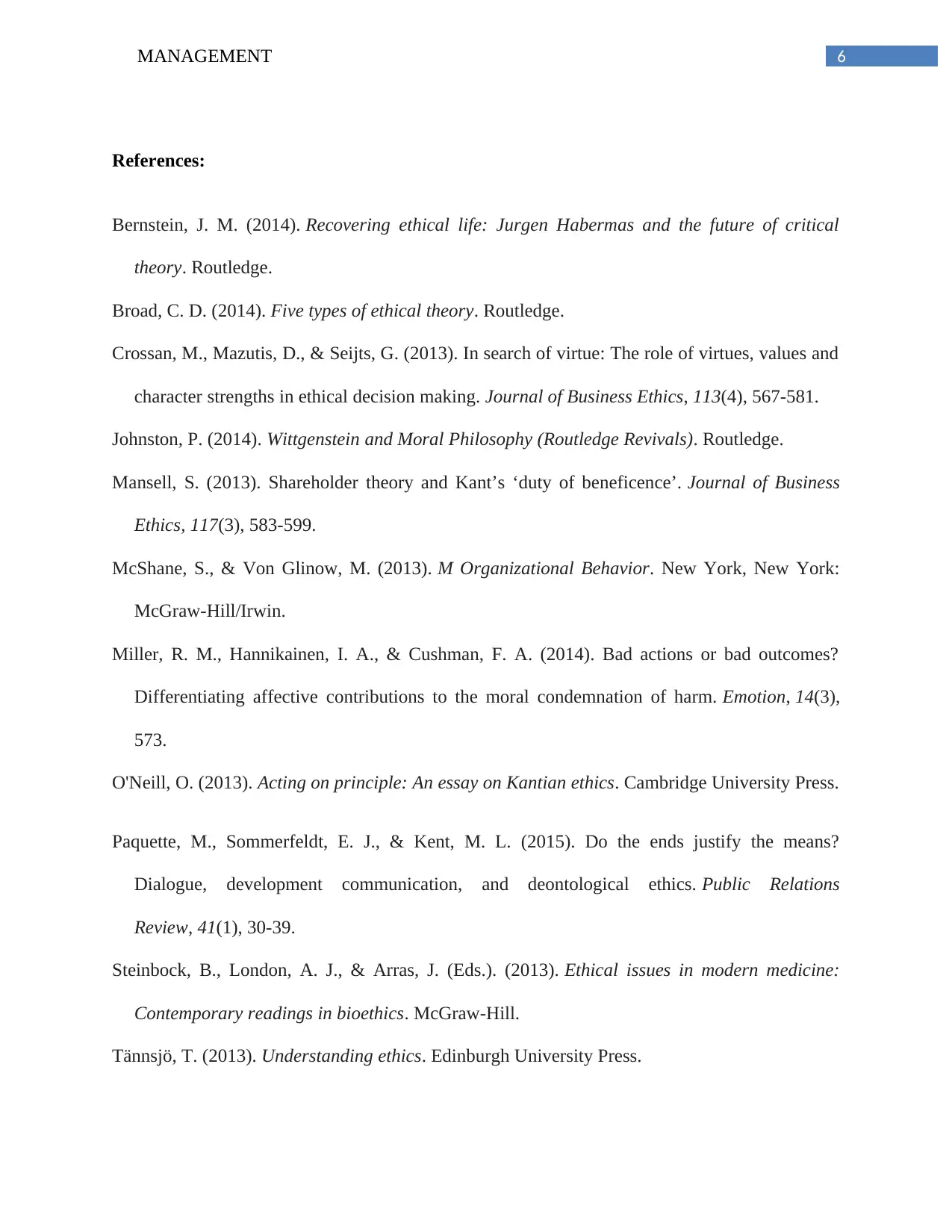
6MANAGEMENT
References:
Bernstein, J. M. (2014). Recovering ethical life: Jurgen Habermas and the future of critical
theory. Routledge.
Broad, C. D. (2014). Five types of ethical theory. Routledge.
Crossan, M., Mazutis, D., & Seijts, G. (2013). In search of virtue: The role of virtues, values and
character strengths in ethical decision making. Journal of Business Ethics, 113(4), 567-581.
Johnston, P. (2014). Wittgenstein and Moral Philosophy (Routledge Revivals). Routledge.
Mansell, S. (2013). Shareholder theory and Kant’s ‘duty of beneficence’. Journal of Business
Ethics, 117(3), 583-599.
McShane, S., & Von Glinow, M. (2013). M Organizational Behavior. New York, New York:
McGraw-Hill/Irwin.
Miller, R. M., Hannikainen, I. A., & Cushman, F. A. (2014). Bad actions or bad outcomes?
Differentiating affective contributions to the moral condemnation of harm. Emotion, 14(3),
573.
O'Neill, O. (2013). Acting on principle: An essay on Kantian ethics. Cambridge University Press.
Paquette, M., Sommerfeldt, E. J., & Kent, M. L. (2015). Do the ends justify the means?
Dialogue, development communication, and deontological ethics. Public Relations
Review, 41(1), 30-39.
Steinbock, B., London, A. J., & Arras, J. (Eds.). (2013). Ethical issues in modern medicine:
Contemporary readings in bioethics. McGraw-Hill.
Tännsjö, T. (2013). Understanding ethics. Edinburgh University Press.
References:
Bernstein, J. M. (2014). Recovering ethical life: Jurgen Habermas and the future of critical
theory. Routledge.
Broad, C. D. (2014). Five types of ethical theory. Routledge.
Crossan, M., Mazutis, D., & Seijts, G. (2013). In search of virtue: The role of virtues, values and
character strengths in ethical decision making. Journal of Business Ethics, 113(4), 567-581.
Johnston, P. (2014). Wittgenstein and Moral Philosophy (Routledge Revivals). Routledge.
Mansell, S. (2013). Shareholder theory and Kant’s ‘duty of beneficence’. Journal of Business
Ethics, 117(3), 583-599.
McShane, S., & Von Glinow, M. (2013). M Organizational Behavior. New York, New York:
McGraw-Hill/Irwin.
Miller, R. M., Hannikainen, I. A., & Cushman, F. A. (2014). Bad actions or bad outcomes?
Differentiating affective contributions to the moral condemnation of harm. Emotion, 14(3),
573.
O'Neill, O. (2013). Acting on principle: An essay on Kantian ethics. Cambridge University Press.
Paquette, M., Sommerfeldt, E. J., & Kent, M. L. (2015). Do the ends justify the means?
Dialogue, development communication, and deontological ethics. Public Relations
Review, 41(1), 30-39.
Steinbock, B., London, A. J., & Arras, J. (Eds.). (2013). Ethical issues in modern medicine:
Contemporary readings in bioethics. McGraw-Hill.
Tännsjö, T. (2013). Understanding ethics. Edinburgh University Press.
1 out of 7
Your All-in-One AI-Powered Toolkit for Academic Success.
+13062052269
info@desklib.com
Available 24*7 on WhatsApp / Email
![[object Object]](/_next/static/media/star-bottom.7253800d.svg)
Unlock your academic potential
Copyright © 2020–2026 A2Z Services. All Rights Reserved. Developed and managed by ZUCOL.
